If you’ve seen one Terminator movie, you’ve seen them all. Well, maybe that’s not true, but the first one is still the only necessary Terminator movie in my book. And everything since — save for maybe the underrated, Anton Yelchin-as-Michael Biehn spectacular Terminator Salvation — have just reworked the same idea. The latest installment, the retconning reboot-quel (or legacy sequel) Terminator: Dark Fate, is entertaining enough, but it’s also more of the same for better or worse thematically and structurally.
That’s why a lot of the movies you should watch after this Terminator are the same as you should watch after the first Terminator. But there are enough relevant movies that either have released since that list was made five years ago or now apply to distinctly Dark Fate elements for me to pull out some new recommendations for you. Some of these picks are inspired by the premise and plot of the sequel, some are suggested viewing for anyone who is newly a fan of some of the cast members. Weirdly enough, more than half of them were released last year.
Halloween (2018)
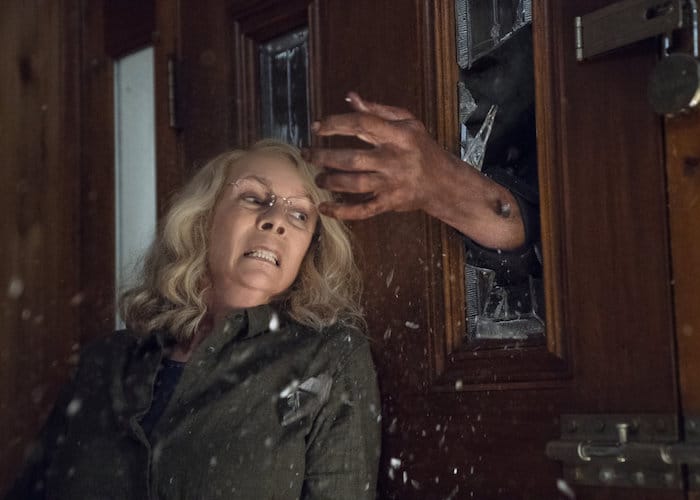
Everyone knows that The Terminator is basically just a sci-fi remake of Halloween (1978), right? James Cameron’s original is a slasher horror movie, just one in which the Michael Myers type comes from the future rather than from a mental hospital in the present. And Sarah Connor is a Final Girl, just like Laurie Strode. So, how perfect that after the Halloween franchise retcons all but the first installment for a new direct sequel, in which its first Final Girl is brought back (as a well-armed kick-ass survivalist) despite having been killed off previously, now the Terminator franchise retcons all but the first two installments for a new direct sequel, in which its Final Girl is brought back (as a well-armed kick-ass survivalist) despite having been killed off previously?
Dark Fate even, like the new Halloween, focuses on a trio of women characters. The main difference, besides the women not being three generations within the same family, is that in Dark Fate they’re not still dealing with the same, now-aged killer as was central to the initial movie. Perhaps Schwarzenegger’s old man T-800 should have been the antagonist once again this time around. The new Terminator also similarly brings back the involvement of the original filmmaker (Cameron is a co-writer and producer here, while John Carpenter returned to score Halloween) yet is directed by someone else.
Do You Trust This Computer? (2018) and The Truth About Killer Robots (2018)

The first person ever to be killed by a robot was Robert Williams at a Ford auto plant in 1979. That’s five years before the release of the original Terminator. In the 40 years since then, cases of industrial machines causing the deaths of humans have been a rarity, fortunately, but as two recent documentaries recognize, that number and a general threat is on the rise. Chris Paine’s Do You Trust This Computer? focuses on the pros and cons of our increased employment of robots and artificial intelligence programs. It’s more related to the early bit in Dark Fate involving humans being replaced by automation plus the sequence featuring a deadly drone. It’s the more pressing doc as a warning, too.
Max Pozdorovkin’s The Truth About Killer Robots goes further to explore not just the concern about automation taking over our jobs but also murdering us, albeit mostly in accidents. And it’s not just factory mishaps, either. It’s self-driving cars, bomb-squad robots, and more. Also, more innocently yet still alarming, it’s about how our dependence on machines and computers is making us lazy. Both films will make you believe that the save for the time-travel aspect, the gist of the Terminator movies is fated to become science-fact.
Tully (2018)

Mackenzie Davis should garner new fans through her performance in Dark Fate. She’s the movie’s MVP for sure, as well as its most central protagonist. While her increased notoriety should steer audiences back to her work in another sequel to an ’80s sci-fi classic (Blade Runner 2049) and the underrated TV series about the rise of the personal computer age (Halt and Catch Fire), I’d like to specifically recommend one of her best showcases, also unfortunately little-seen in its initial run: Tully.
The movie pairs her with Charlize Theron as a night nanny hired to assist with a struggling mother. The younger and older women bond in a way that reminds the latter of her early days. I don’t think it’s a stretch to highlight a similar dynamic going on for the women of Dark Fate, whether it’s Dani being a younger version of Sarah Connor or Dani and Grace having a protector/protectee relationship with a twist thanks to the time-travel scenario. Tully is mostly Theron’s movie but it also displays Davis’ dramatic talent in a way that action vehicles such as a Terminator sequel do not.
Birds of Passage (2018)

Davis should at least be a familiar face to many moviegoers seeing Dark Fate, but Natalia Reyes, who plays Dani, is almost a complete unknown outside of her native Colombia. She has also been on the rise, however, and earlier this year she could be seen in the US release of Cristina Gallego and Ciro Guerra’s Birds of Passage, which we’ve named as one of the best films of 2019 directed by women and which was also shortlisted last year for the Academy Award for Best Foreign Language Film.
Reyes stars in the epic crime drama as Zaida, daughter of an indigenous Wayuu family, in a story chronicling the early days of the Colombian drug trade and cartels from the 1960s through the 1980s. As our own Valerie Ettenhofer writes, the film is “full of spare, surreal dream imagery and stark portraits of the aftermath of violence” that “renders a haunting history for a region few have seen on film.”
The Last Stand (2013)
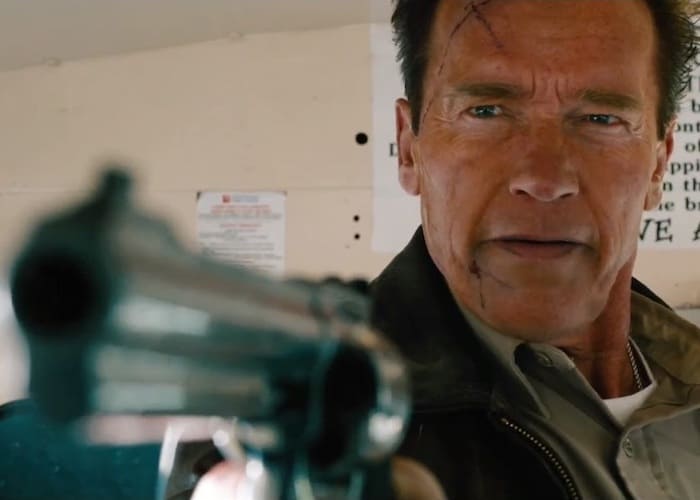
While Davis and Reyes are terrific actresses, and it’s great to have Linda Hamilton back as Sarah Connor, the only genuine capital-m, capital-s Movie Star in Dark Fate is Arnold Schwarzenegger. His role in the latest installment of the Terminator franchise, which initially helped make him a star 35 years ago, is pretty much unnecessary to the plot. But he offers welcome entertainment value in his presence, his comic relief, and of course his action-hero physicality.
Since leaving his political career behind after servings as Governor of California, during which he was on hiatus from movie stardom, Schwarzenegger has had few notable comeback roles. Dark Fate marks his second attempt to resurrect his relevance with his breakout franchise (at least it’s better than Terminator Genisys), and other major parts he’s had have been about gimmicky casting, including his minor appearances in the Expendables series and his pairing with Sylvester Stallone for Escape Plan.
Then there’s The Last Stand, which was his first real marquee return to the big screen, and while not officially tied to another franchise, it’s part of the proof that Schwarzenegger is mostly only being cast in stuff that reminds us of his glory days. This one is like a late sequel to Raw Deal as it presents the actor as an aged lawman in a modern-day action Western with a plot involving the US/Mexico border. It’s not great and doesn’t stand on its own any more than Dark Fate does, but just like the Terminator sequel, it’s still entertaining simply because of Movie Star Arnold Schwarzenegger.
Monsters (2010)
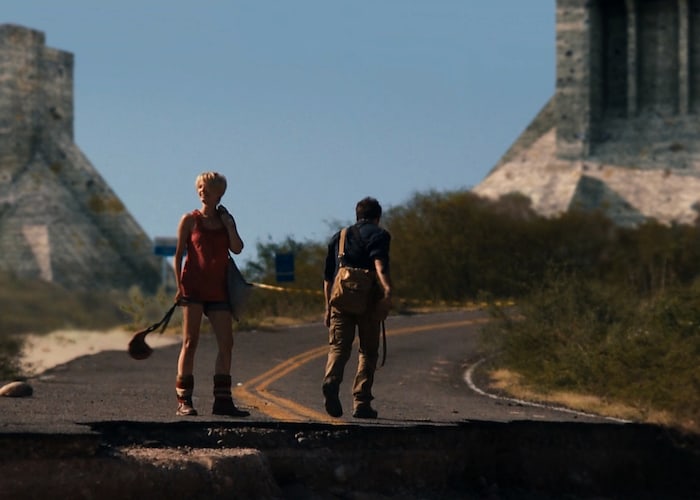
Speaking of movies that, like Dark Fate, involve a difficult attempt of trying to cross the US/Mexico border, Gareth Edwards’ Monsters is another sci-fi film that leans on the contemporary connotations of the border for substantial thematic context. This movie deals with the geography and the idea of a border wall much more heavily and metaphorically, however. Within the premise of the movie, the division of the US and Mexico and all the security measures involved are applied to quarantining the southern nation to contain giant alien creatures there.
The story followed atop that context is a familiar rom-com road trip reminiscent of Frank Capra’s It Happened One Night. Scoot McNairy has the Clark Gable role of a journalist who takes on the task of escorting the daughter (Whitney Able) of a wealthy American and returning her to her home. Like the two white characters in Dark Fate, though, this pair of US citizens don’t have a clear path over the border and must utilize methods typically taken by those looking to escape illegally into the north.
Monsters is an interesting example of a shift in moviemaking today. Like the first Terminator, it’s a low-budget and rather minimalist work of science fiction that helped break out its filmmaker, propelling him to much bigger sci-fi tentpole projects (for Edwards that’s Godzilla and Rogue Nation: A Star Wars Story). Both movies give more priority to their story and characters over the special effects compared to big blockbuster entertainments, though they’re still each impressive for what effects they do have. Monsters features the kind of computer-generated effects that would have been too pricey for a film of its size in the past, yet Edwards doesn’t let it dominate the narrative.
The Son (2002)
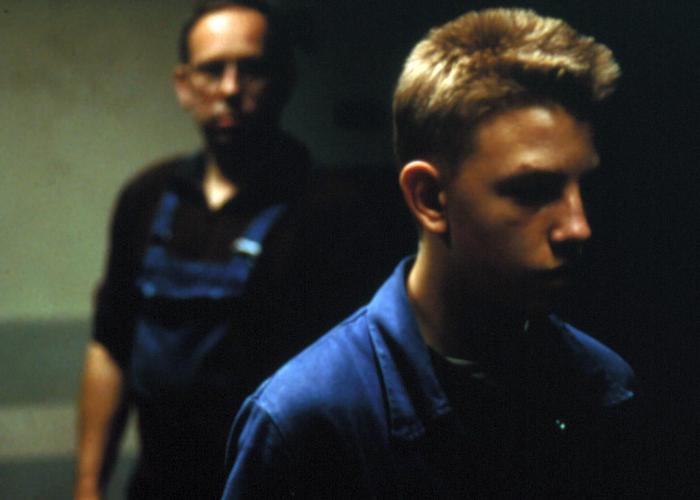
Inside the plot of Dark Fate is a premise we expect to find in indie and foreign dramas. A woman mourning the death of her son is confronted by the man who killed the boy years earlier. Over time, the man had been secretly helping the woman, and she’s grateful for that but still can’t easily forgive the man despite how much he proves to her that he’s remorseful and has changed since the murder he was forced to commit. Eventually, he wins her over and they work together on a job that’s partly done in the son’s honor. Of course, once the man has fully atoned, he still has to die for the sake of narrative tradition.
That’s the dynamic given to Sarah and Carl, the T-800 who kills John Connor at the beginning of the new Terminator movie. Taken out of the surrounding plot, it reminds me of a number of dramas, though most of them involve accidental killings and often wind up having the main characters fall in love in spite of their tragic connection. But the best of the examples that came to mind is The Son (Le Fils) by Jean-Pierre and Luc Dardenne.
It’s about a man who takes in, as an apprentice, the teenage killer of his child (I guess that’s a spoiler, but it’s a 17-year-old film and that’s also the main premise that just takes time to be revealed). Slowly the older man accepts and forgives the younger, who doesn’t even know about their connection. And then they team up to stop a robot from the future. No, just kidding, The Son does the opposite, as a character-driven rather than plot-driven story. There are no fulfilled narrative expectations, cliches or otherwise, just an honest and austere portrayal of morality.
La Jetée (1962)
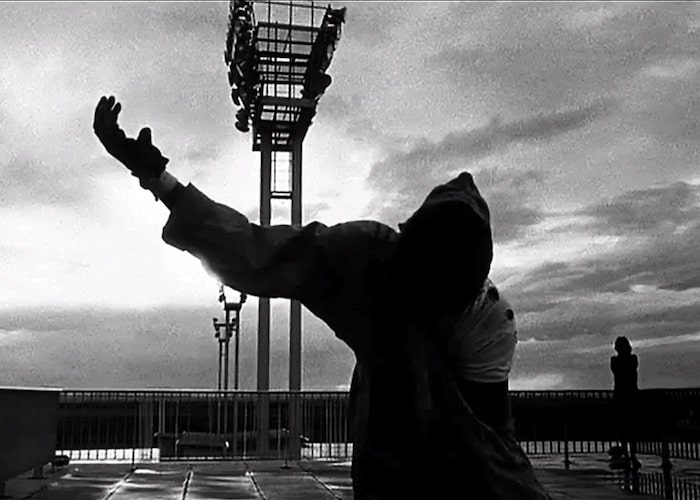
Any sort of closed-loop time-travel story is going to remind me of Chris Marker’s sci-fi short La Jetée. Well, okay, I’ll be honest, I’m firstly reminded of 12 Monkeys since I saw that first (and frankly, in its relative conventionality it’s more processed into the mind and memory). But the scenario of the 1995 Terry Gilliam movie is based on Marker’s experimental film. The plot involves a man from a post-apocalyptic future, and the ending of the movie, it’s revealed, shows us a moment the man is familiar with from his childhood.
If Dark Fate wanted to show inspiration from La Jetée, one of Grace’s flashbacks/forwards would have been a scene we’d later see again from a different perspective. But it’s not necessarily inspired by the Marker film. Instead, the plot involves a woman from a post-apocalyptic future and at the end of the movie we do see a moment from that woman’s past from a different perspective. And there’s a hint that the younger version of the character senses some sort of significance to that moment and a couple of strangers she sees. There’s no twist, nothing really to think about afterward, just a reminder of the circular story.
The post Watch ‘Terminator: Dark Fate,’ Then Watch These Movies appeared first on Film School Rejects.
0 comments:
Post a Comment